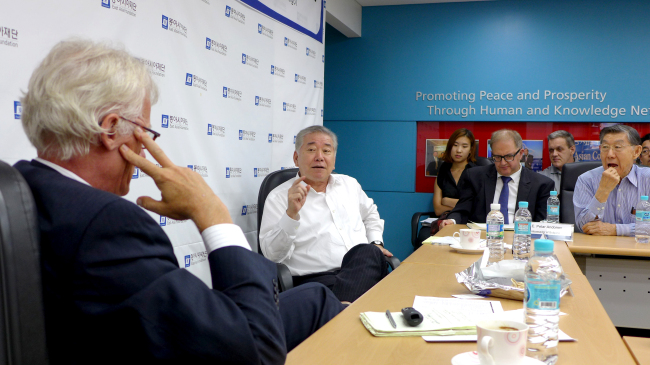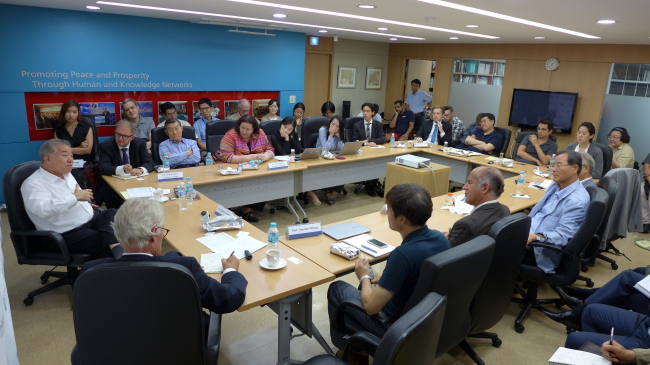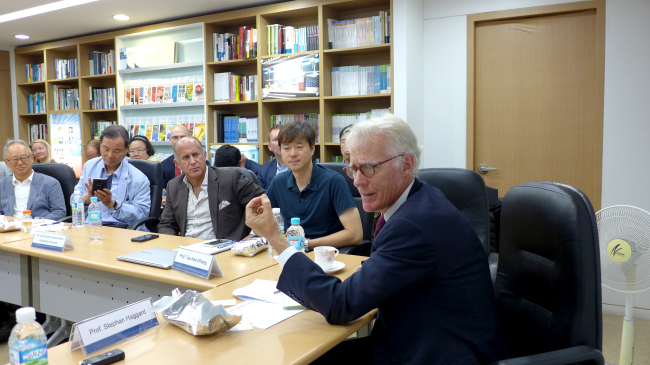With Pyongyang ratcheting up its nuclear brinksmanship and missile provocations, the international community has stood firm in sanctioning the regime through United Nations Security Council resolution 2270, considered the toughest in history.
Predicting “North Korea will fall on a path of isolation and self-destruction through strengthened sanctions and pressure by the international community,” South Korean President Park Geun-hye has justified her preference for using sticks over carrots in disciplining and chastising Pyongyang.
Against this backdrop, some political scientists have stressed that a more “level-headed” and “unemotional” stance is required to tamp down the communist regime’s proliferating menace. They have argued -- against the strictures of punitive diplomacy -- in favor of leaving the door open to negotiation and harmonizing clashing interests.

Professor Stephan Haggard, director of the Korea-Pacific Program at UC San Diego, told The Korea Herald that the purpose of sanctions is to bring Pyongyang back to the negotiating table through six-party talks, with Beijing putting more pressure on its recalcitrant ally.
At a seminar organized by the East Asia Foundation on Aug. 22, Haggard claimed the recent decision to deploy the Terminal High Altitude Area Defense battery in Korea should be discussed with Beijing to bring a positive outcome.
Distinguished professor emeritus Moon Chung-in at Yonsei University Songdo Campus, who chaired the event, said Seoul and Washington should reconsider diplomacy with Pyongyang to prevent chaos in the event of a regime collapse. The following is an excerpt from an interview following the seminar.
The Korea Herald: How do you interpret North Korea’s escalating nuclear program and provocation against the international community’s response?
Stephan Haggard: Nuclear and missile capabilities have become so central to Kim Jong-un’s legitimation strategy that it may be difficult to go back to a negotiating table now. I have argued that neither sanctions nor inducements tend to work with regimes like North Korea. But that doesn’t mean we should stop pushing for it, against all odds.
Nukes have seeped into North Korea’s domestic political culture much more deeply than during the Kim Jong-il era. With China supporting the regime, Pyongyang has no incentive to negotiate.
My pitch is that we should ask China to clarify Chinese Foreign Minister Wang Yi’s proposal in February, which pushed forward the idea of simultaneously pursuing denuclearization and peace treaty-oriented negotiation with security assurance for North Korea.
We should remember that as a matter of American policy, the purpose of sanctions is not to force a regime collapse or destabilize the peninsula but return to the six-party talks, which is very clearly stated in the UNSC resolution 2270.
It seems that Washington has shown some interest in the six-party talks, but Pyongyang has not demonstrated sincere commitment to the 2005 joint statement on denuclearization that came out of the talk’s fourth round. If diplomacy were to be restored, the agenda must include denuclearization and North Korea must send some signal in that regard.

Moon Chung-in: North Korea’s nuclear capabilities are growing day by day, and it is best to minimize their threat while maximizing our security. Kim may be using his nuclear card for internal consolidation and scaremongering. Initially it was for national and regime survival under the logic of minimum nuclear deterrence. But over time, domestic objectives have come to the fore.
We cannot denuclearize North Korea in one shot. As American nuclear scientist Siegfried Hecker proposed, “Three Nos” -- preventing more nuclear and missile tests, barring nuclear upgrading and prohibiting nuclear exports -- are urgently needed. Based on this, we should seek ways to defuse Pyongyang’s security concerns and provide economic and resource support. Temporarily suspending the US-ROK joint annual military exercise should be considered, and ultimately some kind of comprehensive security arrangement, through a peace treaty leading to a peace regime, will be essential.
As we cannot achieve everything at once, we should prioritize our objectives. We can concentrate on denuclearization first, then deal with human rights and other issues.
KH: Do you believe dialogue is still possible at this hostile juncture?
Moon: Pyongyang believes in the instrumental value of the six-party talks, but also that the platform has not yielded any tangible benefits to the regime.
On Jan. 9 last year, North Korea proposed stopping its nuclear testing and missile provocation and allowing inspection by the International Atomic Energy Agency in exchange for a temporary freeze on the US-ROK joint military training. The US flatly rejected it.
On July 6 this year, North Korea officially made a proposal for denuclearization through a five-point demand: the US makes public declaration of its nuclear arsenal in South Korea; the US eliminates those nuclear assets from the peninsula and allow international inspection; the US declares no first use of nuclear weapons; the US guarantees no deployment of strategic weapons in South Korea; and the US makes a declaration that it will withdraw troops from South Korea.
If these five points were met, the North said it will make efforts to denuclearize. Washington did not respond to this proposal, and Seoul called it a “deceitful statement.” President Park has lately argued there is no alternative to sanctions and the deployment of THAAD. The administration’s approach is based on the assumption that Pyongyang will never give up its nuclear weapons and there is no room for dialogue and negotiation. But we can seriously consider the July proposal, particularly the first four, which are negotiable through the six-party talks.

KH: How do you assess the recent rift between Washington-Seoul and Beijing-Pyongyang vis-a-vis North Korea’s nuclear and missile brinksmanship and the decision to deploy THAAD in Korea?
Haggard: North Korea’s diplomatic and military moves, including missile provocations, have very political and strategic objectives. What Pyongyang has been doing is very cleverly dividing the US and China and China and South Korea. By driving wedges between them, it has achieved its strategic objective of inflaming discord among the three powers.
The US and Korea have consistently underestimated North Korea’s ability to enhance its nuclear and missile capacities. Seoul is absolutely justified in deploying THAAD. But the decision to deploy doesn’t mean it has to be deployed.
What Washington and Seoul need to do is reiterate to Beijing and Moscow that the THAAD deployment is contingent upon Pyongyang’s behavior and commitment. They should discuss this issue in the context of Beijing doing something to rein in its unruly neighbor.
Seoul, Beijing and Washington have a collective interest in strengthening their trilateral cooperation. THAAD should be used as a leverage against Pyongyang within this tripartite framework. If they cooperate closely, they will not be manipulated by North Korea.
Moon: Some Chinese officials harbor suspicions over the US’ intentions. They think Washington is not genuinely interested in resolving the North Korean nuclear issue, but trying to use tension on the Korean Peninsula as an excuse to encircle China strategically. Doing so, they believe, would strengthen the US-ROK alliance and US-ROK-Japan coordination more broadly, which fits into Obama’s “pivot to Asia” strategy.
There have been recent revelations that American and North Korean officials discussed the likelihood and conditions of negotiating a peace treaty through China’s mediation, but it is said that Seoul derailed this effort. Given these developments, Beijing thinks Washington and Seoul have no intention of resolving the issue through dialogue and negotiation.
Ultimately, China does not believe sanctions will be effective in denuclearizing the North, as Pyongyang would fire back with more provocations. Beijing cannot freely control Pyongyang according to its wishes.
More importantly, Pyongyang does not perceive THAAD as a big threat. THAAD being a defensive interceptive mechanism for countering incoming missiles, the system is neither for deterrence nor “compellence.” THAAD may be used as leverage against China, but not North Korea. More than THAAD is needed to bring China and North Korea back to the bargaining table.

KH: What is the likelihood of a regime collapse in Pyongyang following sustained pressure and sanctions?
Haggard: When we talk about a regime collapse, we usually refer to failed states with no central authority, as happened in Libya, Liberia, Sierra Leone or Democratic Republic of Congo. Even if there is a regime change in North Korea, it will not likely be one from Kim Jong-un to democracy. Power will fall in the hands of some military junta or a collective autocratic party.
North Korea could face a severe financial crisis from the long-term imposition of sanctions, but even this does not guarantee a political change. High-ranking defections may deal a blow to the regime’s finance, but it is too early to say they are indicative of any deep internal stress.
Moon: This government seems to weigh on the idea of a regime collapse, interpreting recent defections as telltale signs of internal instability. But I do not think a regime collapse is coming. “Collapse” could mean the disintegration of policy and government, regime, system or sovereignty. A sovereign nation’s meltdown is far from likely. What’s even worse, the new authority after Kim Jong-un could become much more unpredictable and difficult to handle than Kim Jong-un, who has complete control over the party-state, military and society.
As unfolded in Libya following the downfall of late leader Moammar Gadhafi in 2011, multiple actors could run amok and fight one another for power. In North Korea, they could try to get hold of nuclear weapons.
It is a catch-22 situation. But my argument is that we should recognize the Pyongyang regime squarely, no matter how evil it is. Having a dialogue and negotiating with Pyongyang will be easier than dealing with multiple unpredictable insurgents. It is also wrong to keep working on the assumption of a regime collapsing as a matter of policy.
KH: With the US presidential election drawing near, there are speculations as to the kind of North Korea policy each candidate might espouse once elected in office. What sort of foreign policy might Hillary Clinton or Donald Trump endorse?
Haggard: Assuming Hillary Clinton will become president, which is more likely than with Donald Trump at this point, she could be much more forward-looking, engaging and hawkish than Obama. But she has also been very committed to multilateral and bilateral diplomacy, the benchmark of Democratic foreign policy. The Democrats have been more internationalist in their stance than the Republicans in many cases. So it will be hard to predict exactly what her stance would be like, also depending on her advisers.
The major issue for the next administration will be how much it will be willing to invest in the North Korean issue. Given that America has a whole range of concerns and interests around the world, the North Korean issue, as difficult as it is, is not a winner for the president to invest a lot of energy in. Therefore it may not be a top foreign policy priority.
The current mood in Washington is not in favor of diplomacy. Wendy Sherman -- former under secretary of state for political affairs who participated in denuclearization negotiations with the North under the Clinton administration -- made no mention of the six-party talks at a forum recently organized by the Center for Strategic and International Studies. Sherman, who could be the next secretary of state under Hillary Clinton, argued that negotiation was futile and the world should prepare for a regime collapse.
Moon: Both Clinton and Trump could be nightmarish scenarios for South Korea. Clinton could be very hawkish toward Pyongyang and change the “strategic patience” into a “strategic offensive,” with much tougher sanctions and show of force through joint exercises and demonstration of strategic weapons. Peninsular stability could be rocked from all sides. Trump might even try using a tactical nuclear weapon if North Korea does not show complying behaviors.
On the positive side, both possibilities will raise the stake of our government to take a leading role. The wishes and preferences of Seoul will be more important along with its roles and responsibilities. Garnering some sort of a peaceful breakthrough via diplomacy will be key.
By Joel Lee (joel@heraldcorp.com)
-
Articles by Korea Herald








![[Hello India] Hyundai Motor vows to boost 'clean mobility' in India](http://res.heraldm.com/phpwas/restmb_idxmake.php?idx=644&simg=/content/image/2024/04/25/20240425050672_0.jpg&u=)










